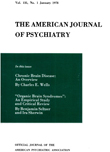Abstract
This study is essentially an attempt to elaborate on a method of giving reassurance and emotional support to aged people. The method is based on clinical data organized in terms of observed adaptational efforts of aged persons. Our results are promising. While there is no doubt that a number of these patients would have done fully as well without treatment it also seems clear that treatment reveals a clue as to how they would have achieved their improvement or stabilization. This is the important aspect of Supportive treatment; it crystallizes a relationship in which the patient can heal some of his psychological wounds, and it watches and controls this process. Certainly if the patient can find a favorable relationship elsewhere the same healing will occur, but not for our enlightenment and without the assurance that everything possible to help keep it a healing process will be done.
The results of treatment are in accordance with expectations based on well-known psychiatric facts. Past performance is the best criterion for prognosis in cases of disordered behavior; and also the probability of good result in treatment is greater where the remaining cortical-integrative function is greater. When predisposition to behavior disorder is great, a small amount of brain damage may prove enough stress to develop a severe reaction highly resistant to treatment. Conversely, well-automatized patterns of social adaptation may obviate the development of behavior disorder even in the presence of severe brain damage; and where stress does produce mental disorder in such cases, treatment may nevertheless be helpful.
Thus the chief contribution of this study seems to be not so much the elucidation of new facts as indication that, where treatment of chronic brain syndrome with mental disorder may be effective, it can be achieved with the expenditure of very little psychiatric time. It is of great interest that only 7½ hours of a psychiatrist's time spaced over a period of 2 years was the greatest amount of time required in our series of improved patients. Also, one of our most salutory results occurred after 6 sessions or 1½ hours of psychiatric help. In both these patients as in the majority of our cases, presence of organic encephalopathy was verified by psychological testing. In those cases that remained unimproved, this outcome could be forecast very early in treatment.
We have found repeatedly that emotional disorganization often exaggerates the picture of brain damage and makes for mistaken belief that treatment will be futile. Many patients who, on cursory study, might have passed as "confused" and "senile" individuals, were found on psychiatric examination to be psychoneurotic in the absence of significant degree of brain damage. As a corollary it therefore seems worth while to give all cases of disordered behavior in aged people a trial of treatment.
Our results indicate that, while our treatment is ineffective in psychosis, it is of some value in psychoneurotic and allied disorders of the minimally brain-damaged aged. In the group with chronic brain syndrome, the results were better than expected. Changes in psychological and social functioning were achieved that permitted continuance of residence in the Home for Aged and Infirm Hebrews for patients who were referred when transfer, usually to a mental hospital, seemed to be the only solution.

